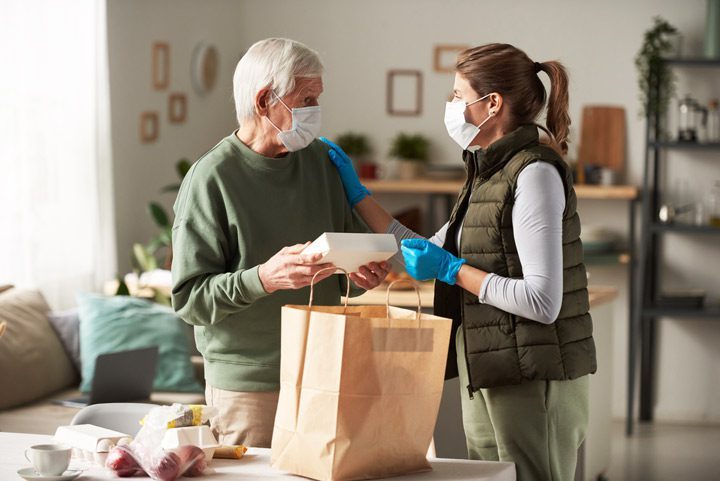
Here’s something interesting: research shows that toddlers will help someone in need simply out of an authentic concern for them. Naturally, this gives us all the immediate “feels” because of their wondrous innocence. What do you think life would be like if adults followed this same basic principle?
Cooperation: The Foundation of Altruism
If we spend too much time watching yelling pundits on television or “doom-scrolling” through social media channels, it’s a challenge to believe that anyone does anything for another person without expecting something else in return. But deep down in our hearts, we know when someone has helped us unselfishly. Sure, it might have been simply letting us into a merging traffic lane ahead of them, but this small act of kindness matters.
In fact, the Greater Good Science Center (GGSC) posits that humans are naturally-inclined to cooperate with one another. It cites evolutionary scientist Charles Darwin’s observation that “altruism—which he called ‘sympathy’ or ‘benevolence’—is ‘an essential part of the social instincts’. Darwin’s claim is supported by recent neuroscience studies, which have shown that when people behave altruistically, their brains activate in regions that signal pleasure and reward, similar to when they eat chocolate (or have sex).”
Is this why we volunteer for a charity event? Pick up the neighbor’s mail? Watch a friend’s children at the last minute? Perhaps. Merriam-Webster defines altruism as “unselfish regard for or devotion to the welfare of others.” But would we practice it more often if it made us feel, you know, that way?
The Boost You Get From Volunteering
In July 2020, The Washington Post published a story with a simple headline: “Want to Be Happier? Try Volunteering.” It reported on a study featuring approximately 70,000 UK respondents conducted by the Journal of Happiness Studies. “Participants answered survey questions about their volunteering habits and mental health, including their distress and functioning in everyday life. They did this every two years from 1996 to 2014,” the Post indicated.
In a nutshell, the results indicated that it wasn’t that happy people volunteered more—although there’s a bit of truth to that—but that individuals became happier over time the more they volunteered. Why? Lead researchers hinted at a combination of factors:
- Volunteering is “intrinsically rewarding,” resulting in a “warm glow” (more on that in a moment).
- The act of service provides a deeper “sense of social connection—especially for older adults.”
- Additionally, younger volunteers appreciated opportunities to “build professional skills and try out new leadership opportunities.”
Now, one might counter that the study participants were indeed receiving something tangible in return for their charitable acts, particularly regarding points two and three. So let’s go back to the first point: the warm glow. GGSC indicates that “repeatedly giving to others may be especially rewarding to us because maintaining our reputation as kind, helpful individuals is crucial to our survival and thriving. Giving for giving’s sake may feel good for longer than does comparable getting, even when repeatedly helping in identical ways. Happiness from giving appears to sustain itself.”
Other Benefits You’ll Notice from Giving Back
So you’re in this good zone: not quite as innocent and selfless as a toddler, but still filled with purpose to extend a helping hand whenever you can. The GGSC notes that you’ll likely experience additional advantages as a result:
- “Spending money on others may lower your blood pressure.”
- “People who volunteer tend to experience fewer aches and pains, better overall physical health, and less depression.”
- “Older people who volunteer or regularly help friends or relatives have a significantly lower chance of dying.”
- “Researcher Stephen Post reports that altruism even improves the health of people with chronic illnesses such as HIV and multiple sclerosis.”
Here are some additional interesting points regarding the volunteering and personal wellness connection:
- Harvard Medical School indicates that “studies have shown that volunteering helps people who donate their time feel more socially connected, thus warding off loneliness and depression.” Additionally, volunteering contributes to reduced stress and the health benefits that result.
- According to Ableto, other benefits of volunteering include increased confidence, a stronger directive of purpose and meaning, and makes you happy.
- HelpGuide adds that certain types of service, such as working with pets, reduces anxiety and feelings of anger.
As long as you follow your passion and choose an effort that matters to you, you really can’t go wrong with a cause. If you’re curious about other ways to give back and cultivate altruism, GGSC has some tips.
Tell Us What You Think
Have you noticed an improvement in your emotional, mental, or physical health as a result of your volunteerism? Why or why not? Start a discussion about it on our Facebook page—we’d love to hear from you!






